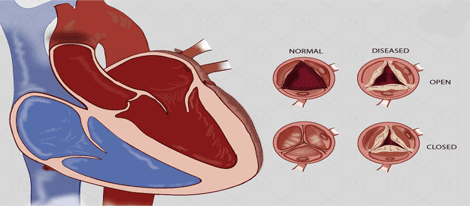What is Rheumatic Heart Disease?
Rheumatic heart disease develops when rheumatic fever permanently damages the heart valves. Heart valve damage can occur soon after an untreated or undertreated streptococcal infection, such as strep throat or scarlet fever. An immune response causes an inflammatory response in the body, which can lead to long-term valve damage.
What is the cause of rheumatic heart disease?
The Best heart care hospital in saket DelhiRheumatic heart disease is caused by rheumatic fever, which is an inflammatory disease that can affect many connective tissues, particularly the heart, joints, skin, and brain Over time, heart valves can become inflamed and scarred. This can cause the heart valve to narrow or leak, making normal heart function difficult. This can take years to develop and can result in heart failure.
Who is at risk of developing rheumatic heart disease?
Untreated or under-treated strep infections can raise the risk of developing rheumatic heart disease. Children who have multiple strep throat infections are more likely to develop rheumatic fever and rheumatic heart disease.
What signs and symptoms indicate rheumatic heart disease?
According to Dr. Rajiv Agarwal one of the best heart doctors in max hospital saket, a recent history of strep infection or rheumatic fever is essential for determining the presence of rheumatic heart disease. Rheumatic fever symptoms vary and typically appear 1 to 6 weeks after a bout of strep throat. In some cases, the infection may have been too mild to be detected, or it may have disappeared by the time the patient sees a doctor.
The following are the most common rheumatic fever symptoms:
- Fever
- Swollen, tender, red, and excruciatingly painful joints, especially in the knees and ankles
- Nodules (lumps under the skin) (lumps under the skin)
- A red, raised, lattice-like rash that typically appears on the chest, back, and abdomen.
- Shortness of breath and chest pain
- Uncontrolled arm, leg, or facial muscle movements
- Swelling

What are the symptoms of rheumatic heart disease?
People suffering from rheumatic heart disease have or have recently had a strep infection. To test for strep, a throat culture or blood test may be used.
Best cardiologist doctor in Delhi NCR Delhi They may have a murmur or rub that is detectable during a routine physical examination. The blood leaking around the damaged valve causes the murmur. The rub occurs when inflamed heart tissues move or rub against one another.
In addition to a thorough medical history and physical examination, tests used to diagnose rheumatic heart disease may include:
Echocardiogram (echo) (echo). This test employs sound waves to examine the chambers and valves of the heart. As an ultrasound transducer is passed over the skin overlying the heart, the echo sound waves create a picture on a screen. Damage to the valve flaps, backflow of blood through a leaky valve, fluid around the heart, and heart enlargement can all be seen on an echo. It is the most effective test for detecting heart valve problems.
Electrocardiogram (ECG).This test determines the strength and timing of the electrical activity in the heart. It detects abnormal heart rhythms (arrhythmias or dysrhythmias) and can occasionally detect heart muscle damage. To detect electrical activity, small sensors are taped to your skin.
X-ray of the chest An X-ray may be taken to examine your lungs and determine whether your heart is enlarged.
MRI of the heart. This is a detailed imaging test that takes pictures of the heart. It could be used to get a better look at the heart valves and muscle.
Blood tests are performed. Certain blood tests may be performed to detect infection and inflammation.
What are the complications of rheumatic heart disease?
Rheumatic heart disease complications include:
- Failure of the heart. This can be caused by a severely narrowed or leaking heart valve.
- Endocarditis caused by bacteria. This is an infection of the heart's inner lining that can occur after rheumatic fever has damaged the heart valves.
- Pregnancy and delivery complications caused by heart damage before becoming pregnant, women with rheumatic heart disease should consult with their healthcare provider.
- A heart valve has ruptured. This is a medical emergency that requires surgery to replace or repair a heart valve.
Is it possible to avoid rheumatic heart disease?
Rheumatic heart disease can be avoided if strep infections are avoided or treated with antibiotics when they occur. Even if you feel better after a few days, it's critical to take antibiotics as directed and finish them.
Being afflicted with rheumatic heart disease
You will need to see your doctor on a regular basis to monitor the condition of your heart. You may be limited in your activities depending on the extent of your heart damage. Your doctor may advise you to take antibiotics for an extended period of time to prevent another rheumatic fever infection.
Important Points
- Rheumatic heart disease develops when rheumatic fever permanently damages the heart valves.
- Rheumatic fever is an inflammatory disease that can affect a variety of connective tissues, particularly the heart
- Untreated or under-treated strep infections increase a person's risk. Children who have multiple strep throat infections are more likely to develop rheumatic fever and rheumatic heart disease.
To book an appointment with the Best Doctor for Rheumatic Heart Disease or in Delhi - Dr. Rajiv Agarwal is one of the Best Heart Specialist in Delhi with more than 35 years of experience in the field of non-invasive and invasive cardiology can book the appointment through https://www.drrajivagarwal.in

